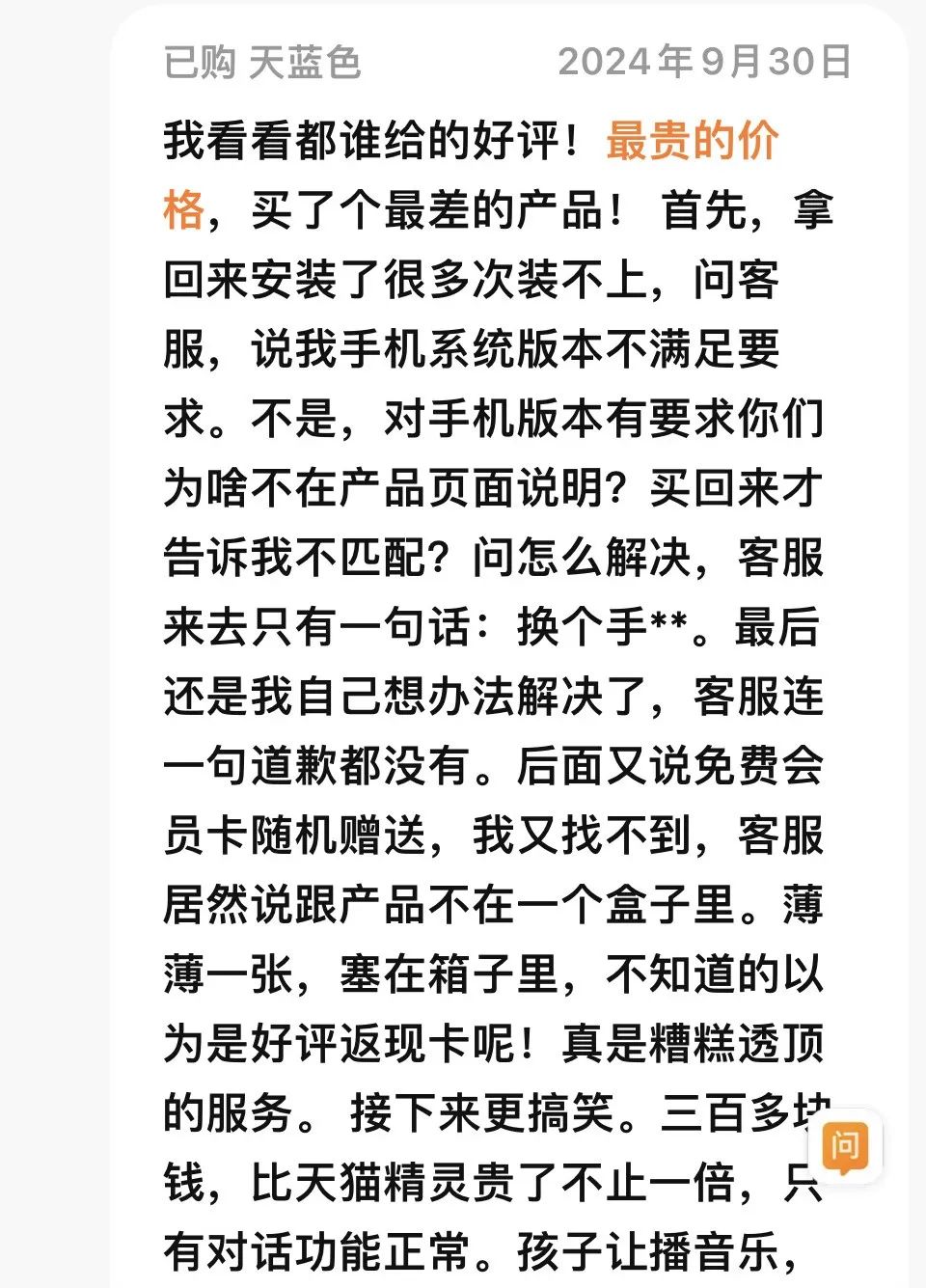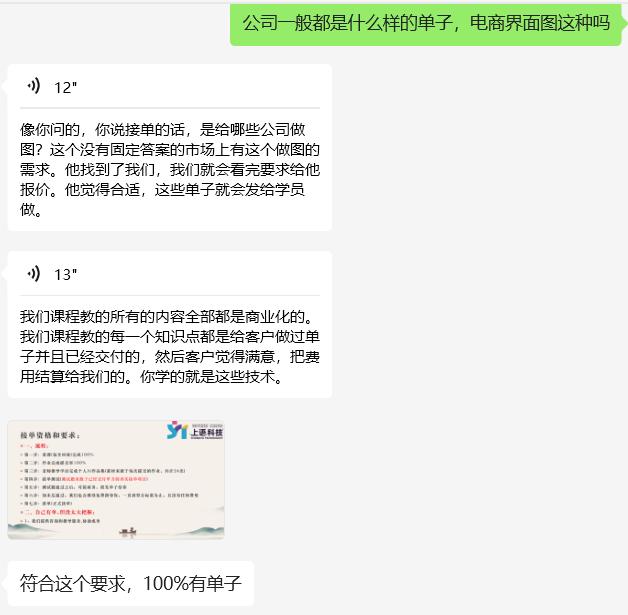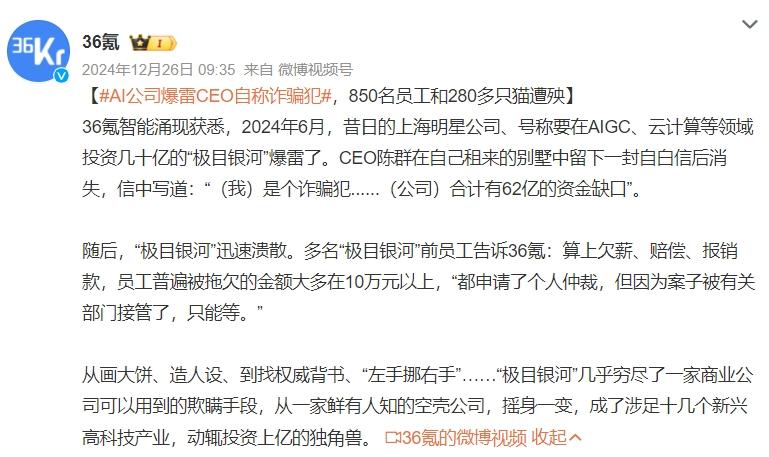How Many Individuals Were 'Harvested' by AI in 2024?
![]() 01/05 2025
01/05 2025
![]() 518
518

"The Surge of AI".
With the rapid advancement of large models, AI applications have steadily matured. In the past year, while many were still contemplating the potential uses of AI, numerous individuals had already leveraged AI products and information gaps to earn substantial profits.
However, amidst these seemingly 'promising' ventures, some have sparked ethical debates, some have been revealed as 'pseudo-concepts' hyped as gimmicks, and others have been outright scams.
In 2024, there was a notable increase in AI-generated content on social media platforms. 'A kitten singing with its mouth open' and 'Empress Zhen Huan firing a machine gun at Emperor Xuanzong'… AI-generated content emerged as one of the hottest trends for self-media.
Some accounts used Stable Diffusion, Midjourney, Koling, or J Meng to create anime avatars, coupled with engaging copywriting, attracting a vast following that was then monetized through promotional partnerships or product showcases. For instance, accounts like 'Sober Qi Grandma' and 'Treasure Luo Grandma', which have recently gained rapid popularity, have become spiritual mentors and emotional outlets for many netizens.

Source: Xiaohongshu Screenshot
It is worth noting that some social media platforms will add a prompt stating 'Suspected to contain AI creation' to works detected as AI-generated. However, due to the increasing difficulty of identification, a significant number of AI works and accounts can evade detection.
In the second half of 2024, netizens claimed to have simultaneously controlled 1,327 AI beauty accounts on Xiaohongshu through account matrix management software, none of which were flagged by the platform.

Source: WeChat Screenshot
Today, many AI accounts remain popular. Some users bluntly stated, 'As long as they look good, does it matter if those real-life bloggers look exactly like their photos? Since none of them are real, does it matter if they are AI or not?'
Consequently, 'AI digital humans' have become a profitable venture for many. An information stream practitioner revealed that they create advertising materials by blending digital humans with live commentary, attracting users to place orders on various platforms. The higher the advertising budget, the higher the revenue. In less than four days, the advertising budget for health product materials exceeded 300,000 yuan.

Source: Official Account Screenshot
In addition to 'digital humans', some individuals also utilize 'AI face swap' technology to impersonate celebrities for product endorsements. Dr. Zhang Wenhong from the National Clinical Research Center for Infectious Diseases previously stated that many short videos on platforms use AI to synthesize his face and voice, promoting products like protein bars and other healthcare items. He has repeatedly complained to the platforms, yet such videos continue to surface.
The production cost of AI face-swapped content is low, but platform supervision is challenging. Both WeChat and Douyin have previously deemed the use of plugins, AI, and other tools to generate virtual image livestreams as violations or banned them. Senior industrial economist Liang Zhenpeng believes that the difficulty in supervising digital human livestreams and digital human accounts lies primarily in distinguishing whether these digital humans truly exist and whether the products they promote are authentic and reliable; moreover, regulatory agencies must also consider how to handle impersonation involving celebrities and how to balance consumer rights protection with innovation promotion.
These 'scam videos' synthesized by AI are typically aimed at middle-aged and elderly individuals with poor discernment and low vigilance. In addition to Zhang Wenhong, celebrities such as Jin Dong and Lei Jun are also frequent targets of 'AI face swap'. Some time ago, an elderly woman in Yichun, Jiangxi, was almost scammed out of 2 million yuan by someone impersonating 'Jin Dong' online, claiming to need money to borrow for filming.

Source: Weibo Screenshot
In October 2024, the Hong Kong police also cracked down on an AI face-swapping 'pig-butchering' scam, which attracted male transfers by forging the identities of advantaged women, involving an amount exceeding HK$360 million.
With the evolution of video generation models, content on platforms is likely to become increasingly indistinguishable from reality. Liang Zhenpeng noted that this will undoubtedly increase the complexity of platform content supervision; in the future, regulatory agencies need to continuously enhance their technical capabilities, and platforms must actively fulfill their social responsibilities, strengthening self-discipline and self-management.
It is noteworthy that at least 60 countries have formulated and implemented AI governance policies. The successive implementation of regulations such as China's 'Provisions on the Administration of Deep Synthesis of Internet Information Services' and 'Interim Measures for the Administration of Generative AI Services' has also provided more concrete leverage for stringent governance.
2024 was a year of intense competition and implementation for large models. Learning machines, glasses, toys, and even mattresses have all embraced 'AI+', emphasizing their 'intelligence' and 'companionship'. However, due to the maturity of technology, most AI-equipped hardware or products in the past year did not deliver revolutionary user experiences.
Previously, remote control, network connection, automatic identification, and control were the primary intelligent functions of home appliances. As the concept of AI gained popularity, home appliances competed to integrate AI: mattresses are equipped with AI algorithms that adjust their height based on different body curves; washing machines incorporate AI intelligent dispensing systems that automatically adjust detergent quantity based on clothing weight and dirtiness...
However, in the eyes of many consumers, the AI functions of these home appliances do not address core pain points, and their actual performance falls short of advertised intelligence. A user of a certain brand's AI mattress mentioned that the lumbar support airbag makes intermittent noise at night, and the sleep monitoring time is inaccurate, 'It feels like paying an intelligence tax'.

Source: Weibo Screenshot
Home appliance industry analyst Liu Buchen stated that the current integration of home appliances and AI is still nascent. 'Over the past decade, home appliances have essentially transitioned from functional appliances to smart appliances, but their essential functional requirements have remained unchanged, and the demand for AI is not as urgent as anticipated, making it difficult for home appliances to become a model for AI technology applications.'
While the experience has not significantly improved, the prices of many AI-concept integrated products have soared. A salesperson selling Casarte AI refrigerators told 'Sohu Finance' that currently, there is no difference between AI and intelligence, and it is still not possible to help users identify ingredients, record freshness, or provide expiration reminders. However, the prices of the two AI refrigerator products in their store are 69,000 yuan and 100,000 yuan, respectively. In comparison, similar refrigerators without smart screens cost around 20,000 to 30,000 yuan; thus, the premium for 'AI refrigerators' can reach about 2 to 5 times more.

Source: Weibo Screenshot
In addition to home appliances, the prices of toys, learning machines, and other products for children and adolescents have also significantly increased after integrating AI concepts.
An AI toy practitioner told the new media outlet 'Tech Planet' that the hardware cost of plush AI toys generally only accounts for one-tenth or even less of the product's selling price, and the AI solution they carry is the key to selling such toys for hundreds or even thousands of yuan.
However, the AI dialogue function of toys is subjective. Some parents stated that AI toys can answer their children's 'ten thousand whys' and are very convenient; however, others believe that the current so-called AI functions do not justify the price. In the commentary section of a wearable AI toy from Haivivi (Yueran Innovation), a consumer mentioned that the toy is more than twice as expensive as Tmall Genie but only the dialogue function works normally, and the functions for playing music and telling stories do not meet their child's needs.

Source: Taobao Screenshot
Internet analyst Zhang Shule once told 'Beike Finance' that the current value of AI toys is still primarily reflected in dialogue, and the educational capabilities provided by AI toys are still insufficient to achieve true educational significance. Jiang Han, a senior researcher at the RDIAC, believes that the advantage of AI toys lies in their ability to combine the fun of toys with the interactivity of AI. In the future, it is necessary to address the issues of interactive experience and content innovation to enable AI toys to better understand and respond to children's instructions and emotions.
Whenever a new technology emerges, 'training courses on how to use it' often appear faster than the applications themselves. In 2024, AI-related courses emerged in succession. Some practitioners even bluntly stated that any industry can be repurposed for knowledge payment using AI.
The most popular paid AI courses focus on AI tool applications, primarily AI painting and video creation. These courses primarily target young people eager to enhance their work skills and develop side hustles. The course prices are mostly above 1,000 yuan and are heavily criticized for 'harvesting' students.

Source: Xiaohongshu Screenshot
Many netizens on social platforms have mentioned that similar free content to the knowledge and tutorials in paid courses can be found on platforms like Bilibili and Zhihu. Most of these training institutions simply systematically integrate free materials and tutorials and essentially earn money from the 'information gap'.
Beginners who are not adept at information retrieval and rarely engage in knowledge payment are easily drawn in by the high-end packaging of course posters and sales pitches. Some netizens said that the primary reason they want to enroll in AI courses is that they believe having a teacher to answer questions and provide better interaction during class is beneficial. This type of user, who is more accustomed to traditional teaching methods, is also the main force behind various paid AI courses.
Beginners' demand for learning new technologies has supported many training institutions. In the first half of 2024, Tsinghua Ph.D. Li Yizhou was banned for illegally selling AI tool training courses, but there are still individuals quietly profiting in this field.
'Qu Xie Shang Ye' observed that numerous courses still teach AI graphics and video creation, claiming to provide students with commercial orders to help them monetize after completing the course. For instance, the price of an institution's AI painting-related course is as high as 5,880 yuan, and teaching assistants stated that if students successfully complete the coursework tests, they will definitely receive commercial orders upon course completion.

Source: WeChat Screenshot
'Qu Xie Shang Ye' found that commercial orders encompass various demands such as interior design and AI e-commerce costume change images, with each order priced at around 20-30 yuan; thus, nearly 200 orders are required to recoup tuition fees. For students with full-time jobs, this is clearly a 'side hustle' that tests their endurance and interest; a single mother also mentioned that learning is not as easy as imagined. Besides AI tools, one also needs to use PS, and the course duration and study time are longer than anticipated, so she is not yet able to take orders for monetization.
On the 'Hei Mao Tou Su' platform, there is an endless stream of consumer complaints about AI training institutions, most of which revolve around issues such as 'teachers being unreachable' after payment, difficulties in obtaining refunds after being induced to pay, and discrepancies with promised results.
If AI knowledge payment is merely a primary means of 'harvesting' students, then utilizing the AI concept to raise money and defraud funding can be considered an 'advanced scam' in this domain.
In 2024, multiple AI technology companies were exposed for financial fraud and inflated business performance.
Recently, Joanna Smith-Griffin, the founder and CEO of the American AI education technology company AllHere, was arrested on suspicion of securities fraud, wire fraud, and aggravated identity theft. The company primarily promotes a chatbot that facilitates communication between home and school. Since the launch of Series A funding in November 2020, until the company's collapse in June 2024, its founder had been conveying false financial information to investors, misleading them about the company's revenue, customer base, and cash reserves.

Source: Weibo Screenshot
As early as June 2024, a domestic AI star startup named 'Jimuyinhe' encountered a significant 'financial crisis.' CEO Chen Qun vanished after leaving a confession letter in his rented villa, stating, "I am a fraudster... (The company) has a total funding gap of 6.2 billion yuan." According to 36Kr, this company utilized various digital technology ventures, including AI, as fronts to attract investments. In reality, however, the company had never possessed mature products or businesses for years, and projects gradually failed to generate profits from funding, ultimately leading to the company's bankruptcy.

Source: Weibo Screenshot
As competition in the large model sector intensifies, many startups have been 'cornered.' A practitioner revealed that in the first half of 2024, the investment market was still vigorously competing for shares in large model startups. By year's end, however, the conversation among large model investors had shifted to, "How do I sell some of the shares in the large model startups I hold?"
An investor involved in large model corporate financing told the tech news outlet 'Tech Planet' that, compared to past investment logic, which centered on technology, prospects, and the team, the internal decision-making cycles of many institutions are becoming longer. They now repeatedly calculate and evaluate the return on investment for new capital. In 2025, funding for the large model sector may become even more challenging.
While new technologies bring about change, they also spark chaos and illusions. From ethical and fraud issues stemming from digital humans to inflated product prices under the guise of AI, to the varied quality of AI training courses and fraudulent funding practices by startups, these issues serve as reminders to practitioners and consumers about the 'AI surge.' More crucial than chasing trends is maintaining sobriety – not being blinded by short-term benefits or lured by alluring gimmicks.






